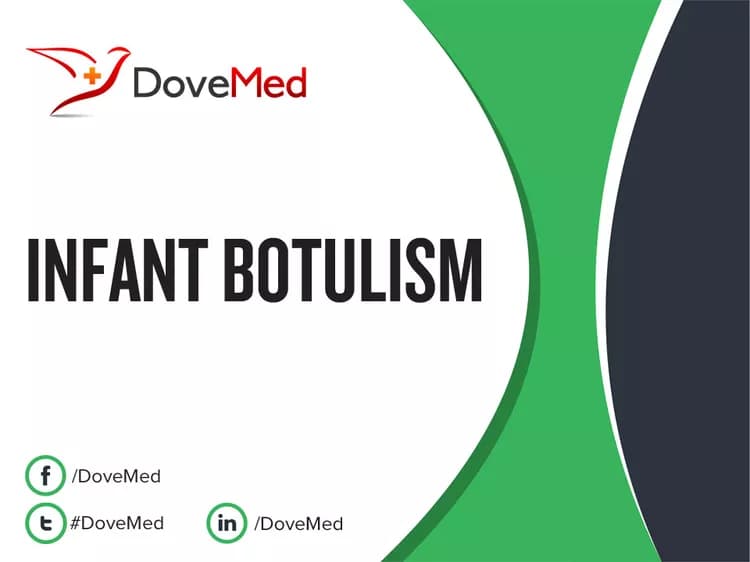What are the other Names for this Condition? (Also known as/Synonyms)
- Botulinus Intoxication in Infants
- Botulism - Food Poisoning in Infants
- Pediatric Botulism
What is Infant Botulism? (Definition/Background Information)
- Infant Botulism is a rare, bacterial food poisoning that affects babies less than 1 year old. It is caused by a bacterium called Clostridium botulinum
- The bacterium produces a toxin which is responsible for producing the signs and symptoms of the condition, which include poor feeding, poor muscle tone, drooping of eyelids, constipation and irritability
- A diagnosis of Infant Botulism is made by medical history evaluation, physical examination, and analysis of the stool of the baby
- Botulism immune globulin is the mainstay of treatment for this condition. Breathing difficulty is the main complication associated with Infant Botulism, which may require breathing assistance
- The prognosis of Infant Botulism is good with early and appropriate treatment, but it can be a potentially life-threatening condition
Who gets Infant Botulism? (Age and Sex Distribution)
- Babies between 3 weeks and 6 months old are commonly affected by Infant Botulism
- There is no gender predilection; both male and female babies may be affected
- Food poisoning in infants due to C. botulinum is observed worldwide; all racial and ethnic groups are prone to this condition
What are the Risk Factors for Infant Botulism? (Predisposing Factors)
The risk factors associated with Infant Botulism include:
- Feeding tinned and canned food (which are not packed properly) to babies
- Infants who consume contaminated honey
- The toxin is sometimes found in contaminated corn syrup too
- Playing in contaminated soil
It is important to note that having a risk factor does not mean that one will get the condition. A risk factor increases ones chances of getting a condition compared to an individual without the risk factors. Some risk factors are more important than others.
Also, not having a risk factor does not mean that an individual will not get the condition. It is always important to discuss the effect of risk factors with your healthcare provider.
What are the Causes of Infant Botulism? (Etiology)
- Infant Botulism is a rare condition that is caused by Clostridium botulinum bacterium, which infects the gastrointestinal system of the baby
- The bacterium produces a neurotoxin (‘neuro’ - nerve, ‘toxin’ - poison) that affects the nervous system. It is a spore-forming bacterium that grows inside the digestive tract of the infant
- Because the immune system in very young children is not well-formed and developed, it results in infection in infants, but not in older children or adults
What are the Signs and Symptoms of Infant Botulism?
The signs and symptoms of Infant Botulism may include:
- Floppy baby, weak and lethargic due to poor muscle tone
- Weak cry, irritability
- Poor feeding, constipation
- Drooling
- Drooping eyelids
- Paralysis that spreads downward
How is Infant Botulism Diagnosed?
A diagnosis of Infant Botulism could involve:
- Complete evaluation of medical history along with a thorough physical exam
- During physical exam, the healthcare provider may look for:
- Decreased muscle tone
- Decreased gag reflex
- Decreased deep tendon reflexes
- Drooping eyelid
- Stool examination: A stool sample of the baby may be examined in the lab for botulism toxin and the presence of bacteria
- Electromyography, to evaluate muscle and neurological signs and symptoms
Many clinical conditions may have similar signs and symptoms. Your healthcare provider may perform additional tests to rule out other clinical conditions to arrive at a definitive diagnosis.
What are the possible Complications of Infant Botulism?
The complication of Infant Botulism may include:
- Respiratory issues requiring breathing machine for support
- Food poisoning in infants due to botulism can be a frightening experience for the parents
How is Infant Botulism Treated?
Infant Botulism is a treatable condition and the treatment measures may include:
- Botulism immune globulin, which is the mainstay of the treatment
- The use of supportive measures during recovery that include:
- Providing adequate nutrition
- Keeping the airways clear
- Watching for respiratory conditions or difficulties: In such cases, breathing support must be immediately provided
- Human-derived botulinum antitoxin may also be used to reduce the effect of botulism toxin
How can Infant Botulism be Prevented?
Preventative measures to reduce the risk of Infant Botulism include:
- Honey and corn syrup, which may be the source of the bacteria, should not be given to infants less than a year old
- Maintain cleanliness and hygiene, especially while feeding the babies
What is the Prognosis of Infant Botulism? (Outcomes/Resolutions)
- Infant Botulism can be a severe and serious condition in children less than 12 months old. However, with prompt and appropriate treatment, the prognosis of the condition is good
- This condition can cause paralysis and death of infants, but it generally takes place only in neglected cases with severe illnesses
Additional and Relevant Useful Information for Infant Botulism:
Older children and adults may get infected by Clostridium botulinum bacterium through wounds that have not been cleaned well. This infection is called wound botulism.
Related Articles
Test Your Knowledge
Asked by users
Related Centers
Related Specialties
Related Physicians
Related Procedures
Related Resources
Join DoveHubs
and connect with fellow professionals


0 Comments
Please log in to post a comment.